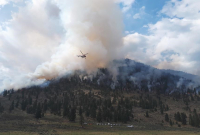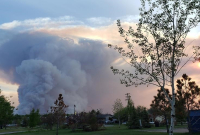Support strong Canadian climate journalism for 2025
Evacuees from Pikangikum First Nation will be taken to host cities in two provinces on Sunday while a wildfire continues to grow near the northwestern Ontario community.
The Canadian Armed Forces said late Saturday it had evacuated about 1,715 people from the fly-in community 500 kilometres northwest of Thunder Bay, with most landing in Sioux Lookout and Kapuskasing, Ont.
A spokesman for the town of Sioux Lookout said evacuees who were airlifted out of Pikangikum on Sunday would be transported directly to Winnipeg, while most of those who have already arrived in Sioux Lookout would be taken to larger communities such as Thunder Bay and Timmins.
Brian MacKinnon said about 19 evacuees would be staying in a hotel in Sioux Lookout because being transported again could jeopardize their health, while seven others were in hospital as a precaution.
"We've been working extremely hard to ensure that families stick together and are not broken up," MacKinnon said.
"The evacuees that have come through Sioux Lookout are tired, and of course they're concerned for their community and loved ones. But generally in good spirits, I think, considering the circumstances."
The military said those most at risk to the effects of smoke from the wildfire, such as children and seniors, have already been evacuated.
Ontario's Ministry of Natural Resources and Forestry said the fire, which started on Wednesday, grew to just over 36 square kilometres on Saturday — about 3,600 hectares — and remains out of control, but favourable winds were keeping it away from the community.
The Manitoba government said in a statement Sunday that it is working with the Ontario and federal governments, as well as the Canadian Red Cross, to co-ordinate temporary housing and services to evacuees.
Red Cross spokesman Jason Small said evacuees from Pikangikum started arriving in Winnipeg on Sunday afternoon and will be put up in hotels.
There was no rain in today's Environment Canada forecast for Sunday, however periods of rain and showers are expected Monday and Tuesday. Environment Canada issued a special air quality statement for the Pikangikum area Sunday morning, warning that people in the vicinity "should be on the lookout for adverse weather conditions and take necessary safety precautions."
Alvin Fiddler, grand chief of the Nishnawbe Aski Nation, which represents 49 First Nation communities across northern Ontario, has said the forest fire damaged the broadband communications line running through the Pikangikum area, knocking out phone and internet service.
Fiddler said he was co-ordinating evacuations efforts from Thunder Bay and that the city is prepping community centres for evacuees to sleep and have access to food and water.
He said officials in the host communities were also discussing how to address mental health concerns from the evacuees and trying to provide services for them.
"There's a lot of anxiety, a lot of stress," said Fiddler. "The threat of the fire is still very real."





Comments